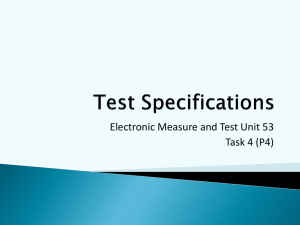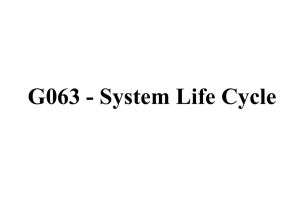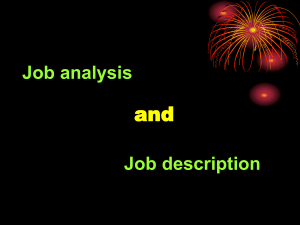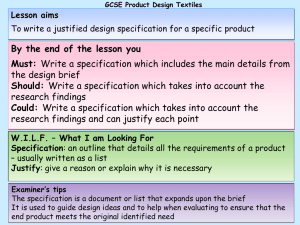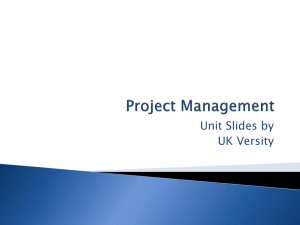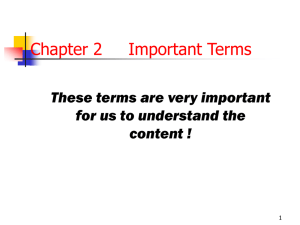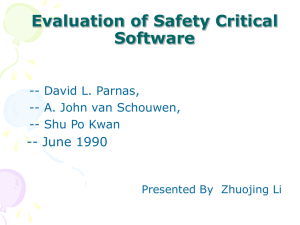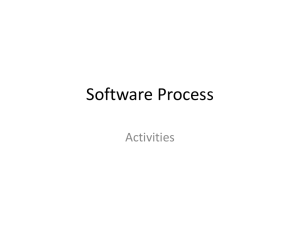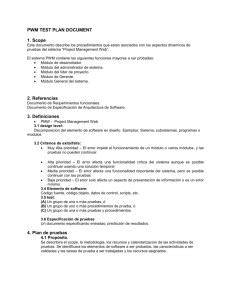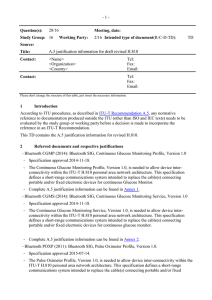Test Plan - ISO/IEC/IEEE 29119 Software Testing Standard
advertisement
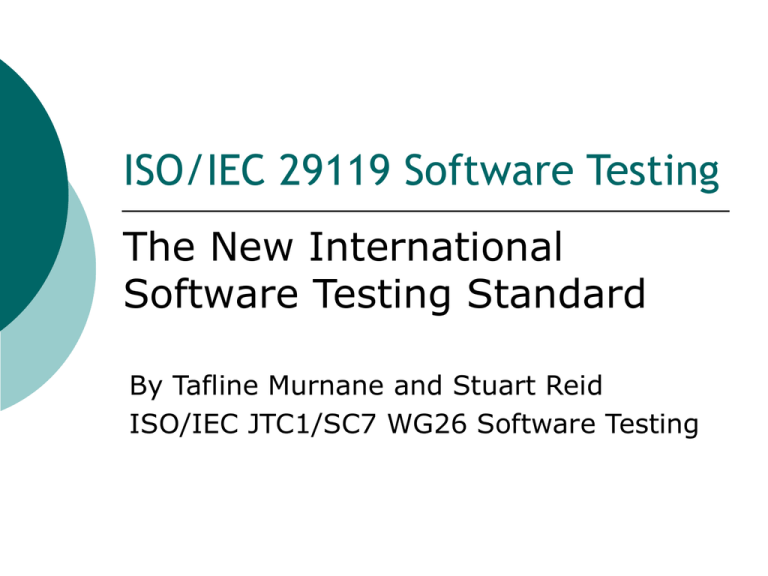
ISO/IEC 29119 Software Testing The New International Software Testing Standard By Tafline Murnane and Stuart Reid ISO/IEC JTC1/SC7 WG26 Software Testing Scope Overview of ISO/IEC 29119 Applicability Recent developments Timeline Future work Motivation for ISO/IEC 29119 Conflicts in definitions & procedures Plethora of standards to be replaced by one IEEE 829, IEEE 1008, BS 7925-1/-2, IEEE 1028 Missing in current standards: Organizational Test Policy & Strategy Project Test Management Common System & Acceptance Testing techniques Non-functional testing ISO 29119 – Scope & Structure Part 1 Concepts & Vocabulary BS 7925-1 Part 4 Part 2 Part 3 Testing Techniques Processes Documentation BS 7925-2 BS 7925-2 IEEE 1008 IEEE 829 Part 1: Concepts & Vocabulary Software testing concepts Introduction to software testing Relationship between testing, development & maintenance Implications of lifecycle models Approaches to testing Testing vocabulary Part 2: Testing Processes Organisational Test Process Test Management Processes Static Test Processes Dynamic Test Processes Instantiating Testing Processes Organisational Test Process [Major revision required] Develop test specification [No change required] Draft Test Specification Gain consensus on test specification [No issues identified with Test Specification] Monitor and control use of test specification Approved Test Specification Publish test specification Updated Test Specification Published Test Specification Review test specification [Issues identified or Scheduled review due or Major organizational change] [Minor revision required] Update test specification Test Management Processes Organisational Test Process Organisational Test Documentation Feedback on Organisational Test Documentation Test Management Processes Test Plan Updates Test Planning Test Plan, Control Directives Static Test Processes Test Measures Test Plan Test Monitoring & Control Test Plan, Control Directives Test Completion Test Plan, Test Completion Report, Test Measures Test Management Processes Test Completion Report Test Plan, Control Directives Test Measures Dynamic Test Processes Test Planning Process Understand Context Scope Organise Test Plan Development Identify & Analyze Risks Analysed Risks Schedule, Staffing Profile Draft Test Plan Approved Test Plan Test Plan Publish Test Plan Gain Consensus on Test Plan Document Test Plan Identify Risk Treatment Approaches Determine Staffing and Scheduling Treatment Approaches Design Test Strategy Test Strategy Test Monitoring & Control Process Test Status Report Test Progress Information Test Plan Set-Up Test Measures Monitor Report Test Control Information [Testing Incomplete] Test Progress Info Measures [Testing Complete] Control Control Directives ...Test Processes... Dynamic/Static/Management Dynamic Test Processes (Phase) Test Management Process (Phase) Test Plan Control Directives Test Measures Dynamic Test Processes Test Design & Implementation Test Specification Test Execution [No Issues Noticed] Test Results [Issue Noticed or Retest Result] Test Environment Requirements Test Environment Setup Test Environment Readiness Report Test Incident Reporting Incident Report Static Test Processes (Phase) Test Management Process (Phase) Test Plan Control Directives Test Measures Static Test Processes Preparation Review Follow-Up Example Test Process Description Described example: Purpose The purpose of the Test Design & Implementation Process is to derive test procedures that will be executed during the Test Execution Process. Test conditions, test coverage items and test cases are created as part of this process. Outcomes As a result of the successful implementation of the Test Design & Implementation Process: the features to be tested are decomposed into Feature Sets; the Test Conditions are derived; the Test Coverage Items are derived; Test Cases are derived; Test Sets are assembled; Test Procedures are derived. Activities and tasks The tester shall implement the following activities and tasks in accordance with applicable organization policies & procedures with respect to the Test Design & Implementation Process. using a standard template (following ISO 24774), for Identify Feature Sets (TD1) … Derive Test Conditions (TD2) … Derive Test Coverage Items (TD3) … Derive Test Cases (TD4) … Assemble Test Sets (TD5) … Derive Test Procedures (TD6) … Information Items As a result of carrying out this process, the following information items shall be produced: Test specifications (test design specifications, test case specifications and test procedure specifications) and related traceability information; Test data requirements; Test environment requirements. Part 3: Documentation Organisational Project Test policy Test strategy Project test plan Test completion report Appendices examples of documents at each level of testing Testing Test specification Test results Incident reports Test environment report Test status report Test completion report Part 4: Techniques Test case design techniques Static Inspections, walkthroughs, etc. Dynamic Black-box, white-box, etc. Non-functional Security, performance, usability, etc. Test measurement (e.g. coverage) Appendices Examples Effectiveness Applicability Generic standard to support all domains Some are more standards-oriented (safety, telecoms) Some will become more regulated (e.g. financial) Needs trialing in all domains & project types Waterfall, iterative, agile New & maintenance projects Information systems & embedded systems When wouldn’t you be selecting and using techniques? When wouldn’t you plan? When can I start using 29119? Typical ISO standards take over 7 years ISO 12207 conceived in 1988, published in 1995, represents 17,000 person hours (8.5 person years) BS 7925-1/2 took 8 years to develop IEEE estimates 2-4 years to develop a standard, at a cost of between $2,000 and $10,000 per page [1998] Timelines Working Draft (WD) Committee Draft (CD) Final Committee Draft (FCD) Final Draft International Standard (FDIS) Final International Standard (FIS) Parts 2 & 3 Parts 1 & 4 FIS FDIS FCD FIS CD FDIS WD FCD CD WD … May 08 May 09 May 10 May 11 May 12 Do you want to be involved? Join the working group through your national standards body 6 day meetings, every 6 months contribute between meetings Join the national working group in your country to: contribute materials review drafts Current status Drafts of parts 1, 2 and 3 are under review Draft of part 4 is underway 18 nations represented: Australia, Canada, China, Columbia, Denmark, Finland, France, Germany, Hong Kong, India, Japan, Poland, Russian Federation, South Africa, South Korea, Spain, United Kingdom, USA Last meeting – Niigata, Japan, May 2010 Next meeting – Washington, October 2010 Conclusions International standard will provide practitioners with guidelines for testing that cover all aspects of life cycle Consistent definitions, processes, procedures & techniques for testing Will be adopted by IEEE, ISO, Standards Australia and other national standards bodies Currently has representation from 18 nations & is being reviewed by software testing professionals world-wide We need to ensure widespread applicability For more information… sreid@testing-solutions.com http://softwaretestingstandard.org/ Keep up to date on our progress ISO/IEC 29119 website http://www.jtc1-sc7.org/ access to official documents
